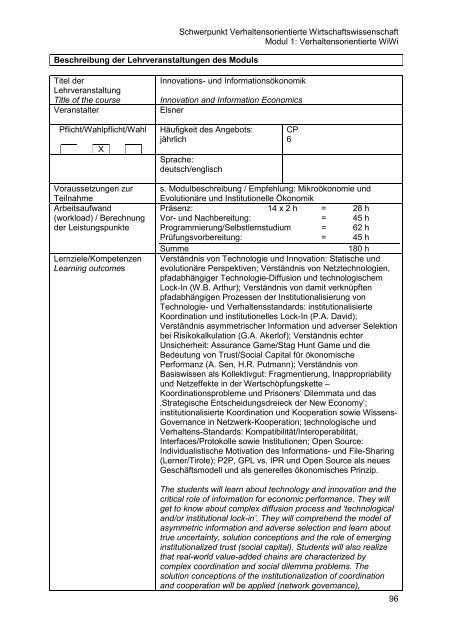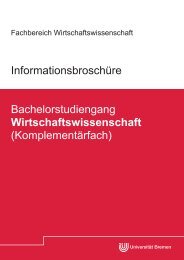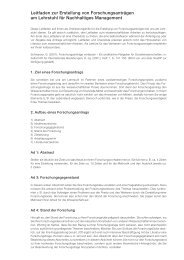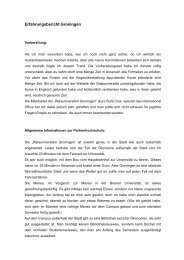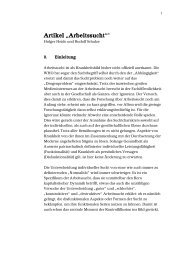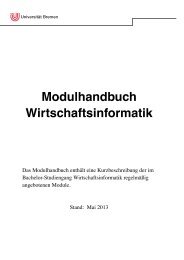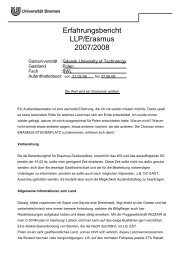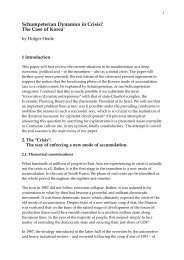Modulhandbuch_BWL_WiWi_WS 12_13.pdf - Fachbereich ...
Modulhandbuch_BWL_WiWi_WS 12_13.pdf - Fachbereich ...
Modulhandbuch_BWL_WiWi_WS 12_13.pdf - Fachbereich ...
Erfolgreiche ePaper selbst erstellen
Machen Sie aus Ihren PDF Publikationen ein blätterbares Flipbook mit unserer einzigartigen Google optimierten e-Paper Software.
Beschreibung der Lehrveranstaltungen des ModulsSchwerpunkt Verhaltensorientierte WirtschaftswissenschaftModul 1: Verhaltensorientierte <strong>WiWi</strong>Titel derLehrveranstaltungTitle of the courseVeranstalterInnovations- und InformationsökonomikInnovation and Information EconomicsElsnerPflicht/Wahlpflicht/WahlXHäufigkeit des Angebots:jährlichSprache:deutsch/englischCP6Voraussetzungen zurTeilnahmeArbeitsaufwand(workload) / Berechnungder LeistungspunkteLernziele/KompetenzenLearning outcomess. Modulbeschreibung / Empfehlung: Mikroökonomie undEvolutionäre und Institutionelle ÖkonomikPräsenz: 14 x 2 h = 28 hVor- und Nachbereitung: = 45 hProgrammierung/Selbstlernstudium = 62 hPrüfungsvorbereitung: = 45 hSumme180 hVerständnis von Technologie und Innovation: Statische undevolutionäre Perspektiven; Verständnis von Netztechnologien,pfadabhängiger Technologie-Diffusion und technologischemLock-In (W.B. Arthur); Verständnis von damit verknüpftenpfadabhängigen Prozessen der Institutionalisierung vonTechnologie- und Verhaltensstandards: institutionalisierteKoordination und institutionelles Lock-In (P.A. David);Verständnis asymmetrischer Information und adverser Selektionbei Risikokalkulation (G.A. Akerlof); Verständnis echterUnsicherheit: Assurance Game/Stag Hunt Game und dieBedeutung von Trust/Social Capital für ökonomischePerformanz (A. Sen, H.R. Putmann); Verständnis vonBasiswissen als Kollektivgut: Fragmentierung, Inappropriabilityund Netzeffekte in der Wertschöpfungskette –Koordinationsprobleme und Prisoners’ Dilemmata und das‚Strategische Entscheidungsdreieck der New Economy’;institutionalisierte Koordination und Kooperation sowie Wissens-Governance in Netzwerk-Kooperation; technologische undVerhaltens-Standards: Kompatibilität/Interoperabilität,Interfaces/Protokolle sowie Institutionen; Open Source:Individualistische Motivation des Informations- und File-Sharing(Lerner/Tirole); P2P, GPL vs. IPR und Open Source als neuesGeschäftsmodell und als generelles ökonomisches Prinzip.The students will learn about technology and innovation and thecritical role of information for economic performance. They willget to know about complex diffusion process and ‘technologicaland/or institutional lock-in’. They will comprehend the model ofasymmetric information and adverse selection and learn abouttrue uncertainty, solution conceptions and the role of emerginginstitutionalized trust (social capital). Students will also realizethat real-world value-added chains are characterized bycomplex coordination and social dilemma problems. Thesolution conceptions of the institutionalization of coordinationand cooperation will be applied (network governance),96


